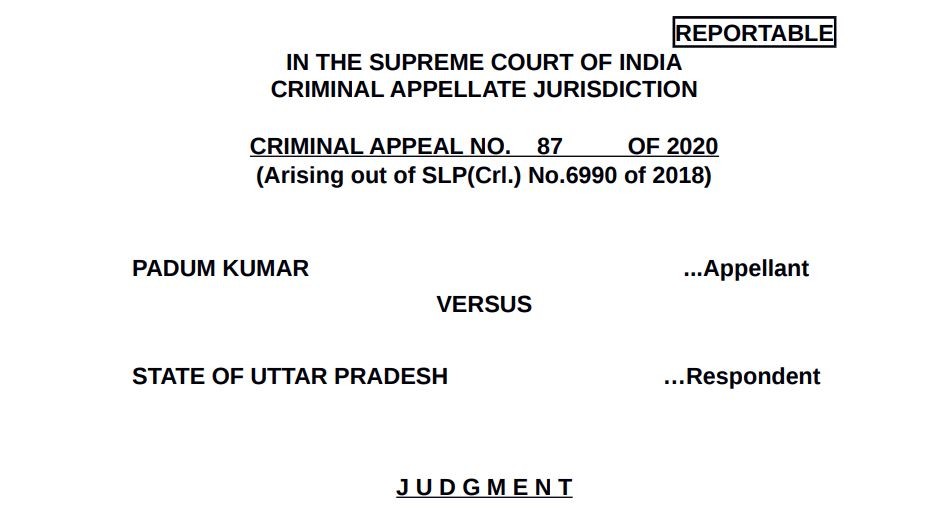- Evidentiary Value of Hand Writing Experts Opinion
- Download PDF Judgement – View
In Magan Bihari
Lal v. State of Punjab (1977) 2 SCC 210, while dealing with the
evidence of a handwriting expert, this Court opined:
“… We think it would be extremely hazardous to condemn the
appellant merely on the strength of opinion evidence of a
handwriting expert. It is now well settled that expert opinion
must always be received with great caution and perhaps none
so with more caution than the opinion of a handwriting expert.
There is a profusion of precedential authority which holds that
it is unsafe to base a conviction solely on expert opinion
without substantial corroboration. This rule has been
universally acted upon and it has almost become a rule of law.
It was held by this Court in Ram Chandra v. State of U.P. AIR
1957 SC 381 that it is unsafe to treat expert handwriting
opinion as sufficient basis for conviction, but it may be relied
upon when supported by other items of internal and external
evidence. This Court again pointed out in Ishwari Prasad
Misra v. Mohd. Isa AIR 1963 SC 1728 that expert evidence of
handwriting can never be conclusive because it is, after all,
opinion evidence, and this view was reiterated in Shashi
Kumar Banerjee v. Subodh Kumar Banerjee AIR 1964 SC 529
where it was pointed out by this Court that expert’s evidence
as to handwriting being opinion evidence can rarely, if ever,
take the place of substantive evidence and before acting on
10
such evidence, it would be desirable to consider whether it is
corroborated either by clear direct evidence or by
circumstantial evidence. This Court had again occasion to
consider the evidentiary value of expert opinion in regard to
handwriting in Fakhruddin v. State of M.P. AIR 1967 SC 1326
and it uttered a note of caution pointing out that it would be
risky to found a conviction solely on the evidence of a
handwriting expert and before acting upon such evidence, the
court must always try to see whether it is corroborated by
other evidence, direct or circumstantial.”
16. Of course, it is not safe to base the conviction solely on the
evidence of the hand-writing expert. As held by the Supreme Court
in Magan Bihari Lal v. State of Punjab (1977) 2 SCC 210 that
“expert opinion must always be received with great caution……..it is
unsafe to base a conviction solely on expert opinion without
substantial corroboration. This rule has been universally acted upon
and it has almost become a rule of law.”
17. It is fairly well settled that before acting upon the opinion of the
hand-writing expert, prudence requires that the court must see that
such evidence is corroborated by other evidence either direct or
circumstantial evidence. In Murari Lal v. State of Madhya Pradesh
(1980) 1 SCC 704, the Supreme Court held as under:-
“4. …….True, it has occasionally been said on very high authority
that it would be hazardous to base a conviction solely on the
opinion of a handwriting expert. But, the hazard in accepting the
opinion of any expert, handwriting expert or any other kind of
expert, is not because experts, in general, are unreliable witnesses
— the quality of credibility or incredibility being one which an expert
11
shares with all other witnesses — but because all human judgment
is fallible and an expert may go wrong because of some defect of
observation, some error of premises or honest mistake of
conclusion. The more developed and the more perfect a science,
the less the chance of an incorrect opinion and the converse if the
science is less developed and imperfect. The science of
identification of finger-prints has attained near perfection and the
risk of an incorrect opinion is practically non-existent. On the other
hand, the science of identification of handwriting is not nearly so
perfect and the risk is, therefore, higher. But that is a far cry from
doubting the opinion of a handwriting expert as an invariable rule
and insisting upon substantial corroboration in every case,
howsoever the opinion may be backed by the soundest of reasons.
It is hardly fair to an expert to view his opinion with an initial
suspicion and to treat him as an inferior sort of witness. His opinion
has to be tested by the acceptability of the reasons given by him.
An expert deposes and not decides. His duty “is to furnish the
Judge with the necessary scientific criteria for testing the accuracy
of his conclusion, so as to enable the Judge to form his own
independent judgment by the application of these criteria to the
facts proved in evidence (Vide Lord President Cooper in Davis v.
Edindurgh Magistrate, 1953 SC 34 quoted by Professor Cross in
his evidence).”
5. …….
6. Expert testimony is made relevant by Section 45 of the Evidence
Act and where the Court has to form an opinion upon a point as to
identity of handwriting, the opinion of a person “specially skilled” “in
questions as to identity of handwriting” is expressly made a relevant
fact……… So, corroboration may not invariably be insisted upon
before acting on the opinion of an handwriting expert and there
need be no initial suspicion. But, on the facts of a particular case, a
court may require corroboration of a varying degree. There can be
no hard and fast rule, but nothing will justify the rejection of the
opinion of an expert supported by unchallenged reasons on the
sole ground that it is not corroborated. The approach of a court
while dealing with the opinion of a handwriting expert should be to
proceed cautiously, probe the reasons for the opinion, consider all
other relevant evidence and decide finally to accept or reject it.”
